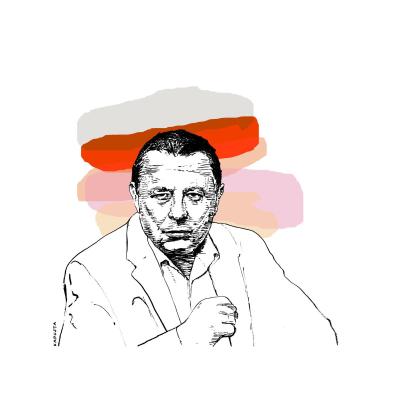The current crisis of our continent raises the following question: Will Europe survive? The question naturally refers to the continent's culture. One could extend the question by asking: Will the West survive?
The question, posed in this way, will be contested by those who say that it is an expression of an old-fashioned essentialist treatment of civilisation and thus, a misunderstanding. Cultures evolve, and their European variety is evolving in an exceptionally dynamic manner. Furthermore, its differentia specifica lies precisely in its capacity for self-questioning that inevitably leads to states of tension known as crises, born out of the maladjustment of traditional forms to novel challenges. Confrontation with them reveals the inner contradictions of the existing order, which are overcome to accommodate a new, already transformed order. This process, and therefore its current manifestation, and the problems we face today, paradoxically testify to the vitality of European culture and may even be considered its natural state of crisis.
One would like to agree with the claims that consider self-questioning and therefore self-criticism to be a distinctive feature of European culture. This in turn would indicate that internal tension is an ongoing state, which relatively often takes the form of crisis, and overcoming it would be an ongoing task. Nevertheless, the current state of affairs is an exception. We must note that we are living in an age dominated by an ideology that, according to its advocates, has enabled man to ascend to the current, higher stage of development and therefore to transcend civilisation as we knew it. In its most modest version, this ideology is seen as a ladder used to reach the current state and to be discarded as no longer necessary. In general, however, the European civilisation, as we know it, is recognised by the dominant ideology as an oppressive, patriarchal model that must be opposed and overcome. The dissent of the late 1960s and early 1970s, recalled with nostalgia by the current underclass of the European establishment, referred to itself as ‘counterculture’. It opposed official culture, but the name also reflected the deeper attitude of the rebels of the time, who rejected the rudiments of our civilisation. Today, the term ‘cancel culture’, introduced in the United States, is increasingly popular. It calls for the annulment of traditional culture, which allegedly does not meet the expectations of contemporary idealists. These slogans indicate that it is not simply a matter of questioning some of the components of existing culture. It is at risk of being rejected in its entirety and thus invalidating what Europe has stood for up to now.
* * *
In 2001, the European Council set up a Convention to tidy up the endlessly proliferating rules known as European law. The Convention's objective was to draw up a draft constitution for the European Union to be discussed in public and then, if necessary, reformulated and adopted by the European Council, the representatives of all the states making up the Union. The Convention, chaired by Valéry Giscard d'Estaing, produced a draft that was to be subject to further debate, yet was unexpectedly announced as a draft Constitution. Everything was settled behind the scenes. The authors of the Constitution agreed on the draft among France, Germany, Italy, and the Low Countries. The other member states did not have time to read it, let alone submit amendments.
What interests us is the document's preamble, in which its authors considered Antiquity as the source of European identity, followed immediately by the Enlightenment and the French Revolution. It should be noted that the point was not to provide a reference for the new ideological project of the EU but to indicate Europe‖s origins. Refusing to refer to the Christian tradition of nearly one and a half millennia, one that shaped Europe and made it a single civilisation, was a departure from its previous form and embarking on a constructivist venture to create it anew. It was moreover a falsification of history, or, to put it more bluntly, an ideological approach to it that does not reckon with facts and treats them arbitrarily in order to create a new reality. It was a deliberate and hard-line stance because despite the protests and indignation of broad European bodies, the drafters of the Constitution refused to include in the preamble an indication of the Christian tradition as the source of our civilisation and finally agreed to a vague provision that ‘the Union draws inspiration from the cultural, religious and humanist inheritance of Europe.’
The draft European Constitution was rejected in national referendums, but nevertheless remained a testament to the attitude of the EU elites. It was not drafted by any radicals, but mainly by representatives of the European centre-right. The Convention's President, Giscard d'Estaing, as President of France, represented the country's Christian Democrats. His deputy, former Belgian Prime Minister JeanLuc Dehaene, was a Christian Democrat. The second vicepresident, former Italian Prime Minister Giuliano Amato did represent the Socialists, but was considered a moderate politician. The team they ran, in which the Christian Democrats had the upper hand, definitively refused to take note of the influence of Christianity on Europe's identity.
Another symbolic image of this was the tribute paid in Trier, Germany, to Karl Marx on the 200th anniversary of his birth. This homage was paid by the then President of the European Commission Jean-Claude Juncker, who had always been associated with the Christian Democrat party. During the celebrations he called the author of Capital ‘a philosopher with aspirations, one who looks to the future.’ The celebration of the birthday of the author of an ideology that legitimised totalitarianism, an implacable enemy of religion, especially Christianity, by the leader of a party formally referring to Catholic social teaching, demonstrates not only the great spiritual and political confusion in which our continent now finds itself, but also the homogenisation of its current elites, the capitulation of those who operated on the right side of the political spectrum and the domination of the leftist-liberal ideology. Indeed, representatives of a party that refers to Christianity in its name, radically oppose the recognition of its importance for Europe's identity and celebrate the founder of an anti-Christian revolutionary ideology. The European establishment, not only political, has been completely colonised by the liberal-left ideology of emancipation and its representatives.
Not so long ago, this ideological cluster would have seemed an oxymoron. Liberals were regarded as the greatest opponents of the left, especially in its radical, revolutionary form. Even today, many see the confluence of these ideologies as an aberration. However, it represents the consistent completion of a historical process that evolved over time. This is because the founders of liberalism, brought up in European culture, took its foundations for granted and did not realise that the ideas they were promoting were undermining them, and therefore did not draw any deeper conclusions from their anthropology.
* * *
The ideology of emancipation, dominant today both in Europe and throughout the West, unlike its predecessors, does not have a specific set of sacred books or a pantheon of prophets who have established its orthodoxy. The number of its contributors is not specified and grows with the number of successive texts that make up its corpus. It is made up not only of respectable works of premium thinking, but also of a mass culture that is almost entirely subject to its dogmas, forged in academia, media, and the legal corporations and bureaucratic centres of the EU. The centres of the new ideology are as dispersed as the power they represent. This is not to say that they are less restrictive but are mainly extra-political in nature. The ideology of emancipation has colonised and subordinated politics. The concept of liberal democracy means embodying the principles of the new orthodoxy and strips politics of its autonomy. It is meant to serve the so-called ― human rights', which, detached from any basis, have become a tool of a more powerful, arbitrary agenda of an increasingly totalitarian system of rules attempting to regulate the entire human life. In this purely procedural democracy, elections, if they give victory to parties outside the ideologically legitimised establishment, are contested and groups that do not submit to the ideology of emancipation are pushed out of acceptable public space and stigmatised as populist, even if they have the most classically conservative provenance, like PiS or Fidesz.
The new ideology has no official name and its existence is contested by its adherents. In their view, it is an embodiment of progress and an expression of the modern shape of rationality and the universal civilisation founded on it, which can only be opposed by people trapped in traditional superstitions or driven by evil inclinations, often labelled fascists in line with the legacy of the Communist Popular Front. Such a stigma delegitimises and removes them from the civilised world.
The key word of the new orthodoxy is emancipation, which is why I call it that way. This slogan is meant to justify any endeavour to achieve it, at the same time revealing the meaning of the new ideology. It holds that the history of man is a succession of stages of enslavement and alienation and, at the same time, efforts to overcome them. Nowadays, humanity has supposedly reached a degree of rationality, expressed also in technological progress, which makes the enterprise of universal emancipation fully possible. The liberation of man from the traditional constraints of both nature and nurture, or civilisation, will let him spread wings and lead to self-realisation. Indeed, culture is the structure that moulds individuals and the human collective and thus moulds them into a certain shape, restrains drives, and curbs the desire for immediate fulfilment. Are we capable of imagining another culture?
The term ideology, like all such words, has a plethora of definitions. The name is sometimes used very broadly, e.g. as any set of reasonably coherent views, which makes it irrelevant. It is therefore worth returning to its origins and recognising it as a phenomenon characteristic of the modern era. Let us assume that it is a system of views unambiguously explaining the entirety of man's existence, his past, present, and future. It is to constitute the cornerstone of a new model of social life created by political methods and seen as optimal by its adherents. Such an approach, which in fact reduces human existence to the ‘here and now’ and is a secular ersatz of religion, regards the latter as its main rival.
* * *
The cultures we know grow out of religions and are significantly determined by them. Apparently, contemporary European culture is a new variation which is liberated from religion. Indeed, religion, especially the founding religion of our culture, namely Christianity, is looked askance at, on our continent today. Officially, religion is supposed to be a private matter, i.e. relegated to an intimate, virtually embarrassing sphere which is inappropriate to even ask about. The fact that religion is to be a private matter and sex a public one says a lot about our time. However, this does not mean a reduction, but rather an annihilation of religion. There is no private religion just as there is no private language. In the broadest sense, it can be defined as man‖s relationship to the supernatural. It pervades and expresses itself in all forms of human existence. The notion that it can be reduced to a kind of inner sentiment is a thorough misunderstanding, but in today's Europe deliberate efforts are made to annihilate it. Man is a social being. This is the nature of his system of ordering reality which is called civilisation. Religion, which he cannot give expression to in collective life, must perish.
The modern West is not so much areligious as antireligious. This is a consequence of the new and dominant secular creed.
* * *
It is generally accepted that Europe, and therefore its culture, rests on three pillars: Greek rationality, Christian religion, and Roman law, and therefore social order. The basic premise is the assumed definite order of things and thus also of the nature of these things, growing out of elementary intuitions. Otherwise, both cognitive activity and the practice of human life, i.e. recognising the conditions of one's existence and adapting to them, and also processing them within the framework of human potentialities, would be impossible. At the same time, however, they indicate our cognitive and creative limitations.
The façade of the temple of Apollo at Delphi, the foremost Greek shrine, bears the maxim: ‘Know thyself.’ This meant recognising one's limits and being aware that humans are not divine. Man's greatest sin was hubris, or pride, the idea that he was able to match up to the Gods. This approach brought misery upon humanity. Pride is the Original Sin that starts human history in the Old Testament, which Christianity took over from its Judaic predecessors. Tempted by Satan, humans eat the fruit of the tree of knowledge of Good and Evil to be equal to God, which brings about their endless suffering throughout history. It is significant that the image of the original sin, which brings misfortune to humans and consists of trying to supersede the Gods, is shared by various religions and mythologies.
The awareness of limitations was reflected in all forms of human activity. It was Pythagoras who allegedly said that he was merely a philosopher (lover of wisdom), as only a God could be wise. Just as human reason encountered limits defined by the wisdom that transcended it, law and therefore the social order had to appeal to justice, and this grew out of the transcendent, metaphysical order of things, and their nature. It was a human ambition to discover it and adapt the political structure to it. The consequence was also a sense of the sacredness and therefore the mystery of the world. These cause the impenetrability of our destinies to ourselves and therefore the human inability to fully control them. It is for this reason that it is not possible for man to achieve earthly perfection and therefore self-salvation.
In Christianity, man's sense of frailty (sinfulness) and limitation was exceptionally evident. Christ's kingdom was not of this world, and the notion that a paradise could be created on Earth before his second coming was heresy. Man had a duty to pursue the divine will in his life; this was mainly facilitated by the Church, but man had to reconcile himself to the imperfections of temporality.
This did not mean the condemnation of the world. European culture, Christianity included, was dominated by the affirmation: God has created goodness and while man has tainted it through sin, despite his limitations, man was able to make the world his home, albeit without any illusory hopes of building a perfect order.
* * *
Modernity led to a denial of the core ideas of Europe's identity. Rationality degenerated into the hubris of individual reason, which is supposed to establish standards for itself and produce definitive solutions. The paradox of this approach is best exemplified by its classic, Descartes.
In order to obtain undisputed knowledge, the philosopher rejected the previous knowledge available to man. He was unable to achieve inaccessible certainty, yet in a purely rational sense he was able to undermine all the data we use in the process of obtaining knowledge. Instead of certainty, therefore, he achieved its negation.
Descartes believed that purely rational speculation would help him arrive at infallible knowledge. It turned out that there was no way to achieve this by purely rational means and all that remained of the method adopted was doubt, which questions both God and the world and calls into question the very cognitive process itself.
The irresistible knowledge that was supposed to arise from rational insight was supposed to anchor man in a certain reality and to provide an unshakeable foundation for objective cognition. Instead, purely rational speculation rendered the world unreal and left only the subjective perspective as a certainty, transforming itself into a kind of solipsism.
It is difficult to find a more illustrative lesson in the failure of man's rational hubris. However, Descartes' successors drew no conclusions and continued to take up his enterprise leading only to a questioning of the world and its rules and consequently to scepticism, or arbitrary and dogmatic constructions, which are the reverse of scepticism. The foundation of metaphysics, i.e. the recognition of an order that transcends us, was rejected. The world became a malleable matter to be shaped at will. In his own mind, man acquired divine powers and sticks to this notion, although it proved futile in a short time.
Thinking, which, like culture, must be a communal endeavour and must entail a multigenerational effort, has disintegrated into individual and group projects of increasing eccentricity; their principal aim is to deconstruct the thoughts that preceded them.
* * *
The hubris of individual reason is linked to the questioning of the social nature of man and his reduction to a supposedly self-creating monad. This effectively annihilates the tension that adds to the dynamism of European culture, particularly evident in Christianity. The thinkers who refer to it have never questioned the social nature of man, while recognising that he cannot be reduced to any of the communities that constitute his identity. According to Christianity, man was created in the image and likeness of God and will ultimately personally account for his life to Him. This account is the precondition of his salvation or damnation. It was Christianity that commanded that every human being be seen as a neighbour, which was a real advance on the particularistic ethics of specific collectives. The universalism of Christian ethics and the particularism of human existence represented a dilemma that was never fully resolved, while at the same time unleashing a creative element in European culture.
Modern hubris gave rise to the image of an individual whose existence precedes his social being. Its consequence is the myth of the social contract, which entails another one, namely the vision of the pre-social existence of man in the state of nature. It constitutes the initial idea of the political doctrine of liberalism. It assumes that the legitimacy of the political system must be the universal and rational acceptance of the subjects. It was a kind of mental experiment, which is nevertheless to become the foundation for the legitimation of human orders. According to the new rationalist claim, all human regimes must be definitively and clearly explained and designed.
The social contract must assume that the political subject is a fully rational individual who shapes reality according to his or her needs. It thus grows out of a liberal anthropology that treats the human person as an individual being, capable of consciously and holistically discerning and determining his or her environment. This makes it possible to abstract the individual from this environment and assume a consensus of individuals living in a mythical state of nature, whose consent will only become the foundation of civilisation.
Such an approach should be regarded as a misunderstanding. We become human individuals not on our own, but by learning and absorbing the culture that creates us, without which we would not be able to develop human qualities. As humans, therefore, we grow out of a community.
The social contract reveals the individualist anthropology that this current, not always consciously, evokes. It reveals the arbitrary nature of these supposedly absolute rational accounts, which its creators make, but whose effects differ fundamentally.
This dissimilarity, moreover, is another argument for the fact that rationality itself is unable to fund itself, since by appealing to different, pre-rational assumptions, we can arrive at radically different, though equally justified, conclusions.
To act rationally is to act for the good of man. What is it, though? Utilitarianism assumed that it could be unambiguously defined, collated, and added up and that these calculations would contribute to a fully transparent system that would finally resolve moral dilemmas and offer algorithms for appropriate conduct. The result was a chaos of contradictory concepts and a previously unknown ethical Gordian knot. Neither Kant's maximalist project detached from human experience, nor the related successive equations of moral arithmetic proved a remedy.
* * *
The idea of the social contract reduces the functioning of the collective to an agreement entered for the sake of individual benefit. It therefore negates any community and leads to anomie, the breakdown of communal bonds, and creates and apotheoses a narcissistic mentality. The sense of unity of interest and fate must therefore be replaced by formal ties, i.e. law, which is to become the only tool for building social order.
The law becomes the new blueprint for a social utopia and attempts to regulate all spheres of life: intimate and family relations, the entirety of the relationship between employer and employee, and all our behaviours, expressions, and attitudes. It has increasingly more totalitarian ambitions and is becoming a tool of social engineering to construct the European or the new man.
In order to achieve this, the law must destroy the traditional forms of existence of the inhabitants of our continent, as well as all the stronger identities that define their status, such as nation, religion, and even family and gender. It deconstructs classical European culture and its tenets.
Law is thus to replace custom, ethics and the market and become the exclusive system for regulating human behaviour. At the same time, it inevitably detaches itself from the idea of justice and universal ethical intuitions. It refers to ad hoc derived successive human rights, whose main concern is supposed to be to take care of arbitrarily created minorities. Such law becomes a tool of the ideology of emancipation.
Understood in this way, law has the ambition to replace, or at any rate to strongly reduce, politics, i.e. the sphere of self-determination of real, national communities apart from the most powerful who exploit this state of affairs. It also means the abolition of democracy as we know it.
But, since objective principles of justice have disappeared, law has lost its basis. Admittedly, the experience of totalitarianism, especially Nazism, led to the questioning of a radical version of classical legal positivism. Its preeminent contemporary advocate, Herbert Hart, proclaimed that if a society did not want to be a suicide club, its normative system had to include a minimum of natural law, but where would we get this if we have negated metaphysics and the order of things?
The most striking exemplification of this has become human rights, which are supposed to be the exclusive norm of the liberal order, but at the same time have been divested of any basis. They grew out of the law of nature, but once it was challenged, they lost any foundation and became a wish list of influential groups. A similar process can be observed with regards to the equally abused idea of ‘human dignity.’ It must grow out of the sanctity of human life, understood in one way or another. But how can it be reconciled with the hedonism that dominates today and stems from the ideology of emancipation and the questioning of the axiological order? How can it be reconciled with treating abortion as a human right? If we accept that in order to be recognised as such, certain criteria must be fulfilled, and this is the assumption that an embryo or even a child being born is not yet a human being, we open a space of arbitrariness in which persons with disabilities or mental illnesses might be excluded from humanity.
* * *
Our supposedly supremely rational age continually appeals to fetishes and taboos. Doubts about the liberal order inevitably lead to a fascist hell and so the appeal to patriotic identity and masculine virtues are surrounded by taboo fears. Human rights, dignity, freedom, as well as democracy, tolerance, pluralism, or openness are fetishized. It turned out that making them into liberal totems not only drained them of their essence but made them a negation of their basic meaning.
Freedom was stripped of its cultural context and came to mean freedom from it. Emancipation led to man being stripped of his cultural form and handed over to the mercy of drives. Can the liberation of the sensual, animalistic side of our being be considered freedom or its negation?
The ambition of emancipatory ideology is to liberate man from all traditional, religious, cultural, national, familial, and gender identities. The higher stage of evolution we were supposed to reach in this way proved narcissistic loneliness, which is defenceless against the pressure of interest groups, the status of perfect customer of both goods and ideologies.
Democracy is supposed to regulate all spheres of life that are incompatible with it and, as a rule, based on authority, and leads to the destruction of education, universities, and higher culture, while in its field, i.e. politics, it has been replaced by a ‘liberal’ variety that turns out to be ideological oligarchy.
Tolerance means the exclusion from public discourse of ideas incompatible with the dominant orthodoxy, which, in the fight against hate speech, are combated and criminalised. Openness means rejection of criticism of prevailing dogmas, while pluralism means a variety of identical views, attitudes, and patterns of behaviour.
Contemporary Europe has consciously dissociated itself from its founding culture, stigmatised and rejected it. In a less conscious way, it has denied the ideals that its new emancipated form was supposed to achieve. As a result, we live in a world that does not understand itself and imprisons itself in successive contradictions because it refuses to rethink and understand itself. One gets the impression that Europe's primary intellectual endeavour is to mystify its current state. In Poland, we know that from the communist era, which tried to defend its ideological legitimacy at all costs, even though practice proved it wrong throughout. Both then and now, it has been in the interest of the ruling class; as then, it cannot be sustained for long. However, its destructive consequences cannot be overestimated.
* This article was originally published in the book entitled The Spiritual State of Europe, Ośrodek Myśli Politycznej (Centre for Political Thought), Kraków 2022.











Comments (0)